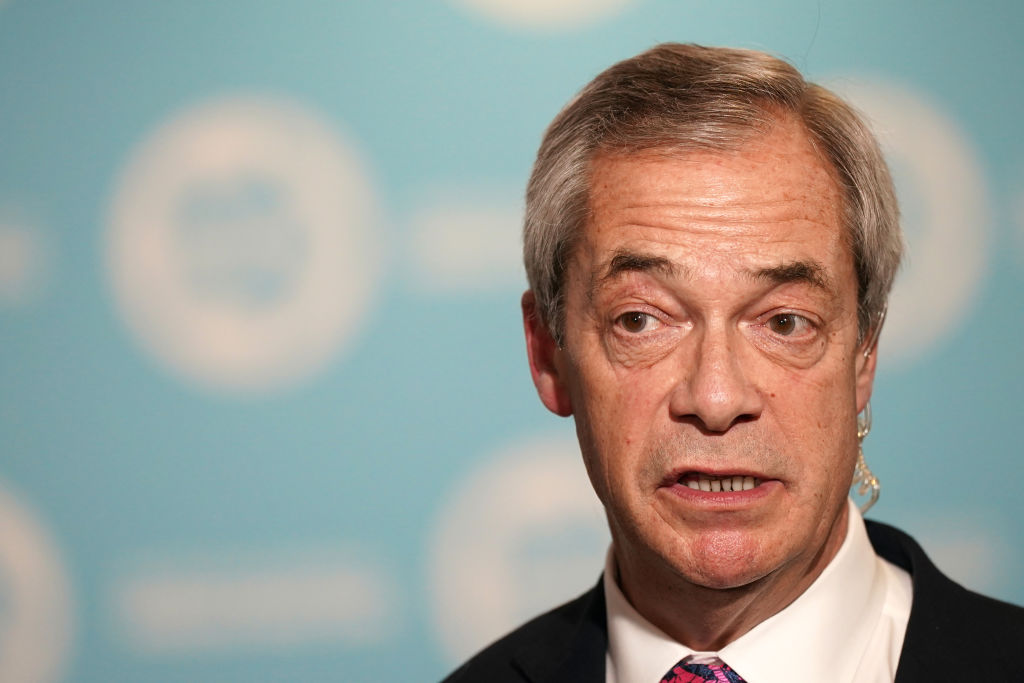‘I just thought Reform cared about national borders and sovereignty’. So sighed the journalist Julia Hartley-Brewer at the end of her recent interview with the party’s deputy leader, Richard Tice. He’d been trying to argue that Donald Trump was right to cut Ukraine out of peace talks with Russia. A normally polished media performer, I have never seen Tice look so uncomfortable as he was when being grilled by Hartley-Brewer on ‘how much of Britain would you give away if we were invaded?’.
This week, it was Nigel Farage’s turn to appear hostile to Ukraine on national radio. Discussing Friday’s showdown in the Oval Office on LBC, he took the side of Trump over Zelensky, claiming the Ukrainian president had been ‘rude’ and ‘played it very badly’. He also suggested that Zelensky should have ‘thought about’ wearing a suit to the meeting. Presumably he considers Winston Churchill to have been similarly louche and disrespectful for wearing an air-raid suit during his visit to the White House in 1942?
For the party that presents itself as being most in-tune with ordinary voters, Reform seems surprisingly relaxed about taking a minority position on the biggest foreign policy issue of the day. Recent YouGov polling found British voters continue to strongly support Ukraine, with 74 per cent of the UK public, including 66 per cent of Reform voters, agreeing with Keir Starmer’s view that it is reasonable for a country not to hold elections while fighting a war within its own borders.
On the developing split between Washington and Kyiv, 48 per cent said Britain backing Ukraine is more important than maintaining good relations with the United States. Just 20 per cent felt the opposite. In fact, on the issue of whether Ukraine should keep fighting, the most common answer among Britons was to discourage Zelensky from accepting any deal that left Russia in control of conquered territory, and continue providing military aid.
Unsurprisingly, Reform’s opponents smell weakness, especially after Donald Trump last night vowed to immediately halt all weapons supplies to Ukraine. Labour insiders see the issue of Ukraine as a way of undermining Farage’s claim to speak for patriotic voters. Meanwhile, the Shadow Foreign Secretary, Priti Patel, has wasted no time in comparing Farage to Jeremy Corbyn for ‘equivocating over Russia’s illegal war in Ukraine’, saying the Reform leader’s criticism of Zelensky is ‘both morally wrong and diplomatically counterproductive’.
The Corbyn analogy should worry Farage. In the months following the 2017 election, the then-Labour leader looked like a viable contender for Downing Street. The moment his fortunes started to turn was his disastrous response to the Salisbury poisonings, in which he seriously suggested that a sample of the Novichok nerve agent be sent to the Kremlin so Russia could determine if it was theirs or not. His credibility was shot.
Farage should have learned his lesson by now. His comments last June to the BBC’s Nick Robinson that he ‘admired’ Vladimir Putin and that the West had ‘provoked’ the war in Ukraine stalled Reform’s momentum during an otherwise successful election campaign for the party. Whilst it’s true that voters care more about domestic issues than foreign policy, failure to adequately stand-up to Britain’s enemies will, rightly, be seen as disqualifying in the eyes of the electorate.
Perhaps Farage has calculated that by the time of the next election Ukraine will have either fallen down the agenda or off it completely? Perhaps he also sees advantage in continuing to present himself as Trump’s preferred British leader? But as Elon Musk’s slapdown of Farage in January showed, when he claimed the Reform leader ‘doesn’t have what it takes’, there is no room for loyalty or sentiment among Trump’s inner circle.
All of which raises the question as to whether Reform will change course, or at the very least, moderate some of their increasingly anti-Zelensky language as Trump ramps up the pressure on Ukraine.
Whilst it’s true that a significant portion of the party’s core support shares Trump’s antipathy towards Kyiv, the British public as a whole takes a very different view. If Farage and Tice are serious about challenging for power at the next election, they cannot gamble on being so far removed from mainstream voters on such an important issue. At the moment, they risk looking like Russian stooges.







Comments